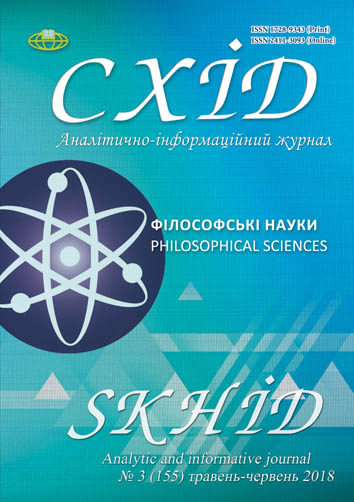The idea of history in the right-conservative philosophy in the 1920’s and 1930’s
DOI:
https://doi.org/10.21847/1728-9343.2018.3(155).139759Keywords:
"conservative revolution", "оrganized nationalism", nation, history, will, historical destiny, charismatic leader, creative minorityAbstract
This article is devoted to the analysis of the historiosophical concepts of the "conservative revolution" in the 1920’s and 1930’s and the related theories which are united with the right-wing conservative worldview. The topicality of this article is to find out common and distinctive features in undestanding the idea of history in the West European tradition, in particular, German, and Ukrainian ones. The purpose of this study is to conduct a comparative, ideological and conceptual analysis of the development of history concept in the philosophical tradition of the "conservative revolution" and Ukrainian "organized nationalism". This study identifies the common and distinctive features of these phenomena. Common features for both of them include the nation primacy over the individual, the rise of the nation as a driving force of historical changes, the protest against the established values of the old world, elitism and recognition of individual’s special role in history, the will to power as a factor of social changes.
Key differences. In western right-wing philosophy, the leader or noble minority was that kind of force who could lead already existing nations; at the same time, the Ukrainian tradition was about educating the national elite on new principles. That required overcoming the village, provincialism way of world perception as well as "plebeian philosophy", obedience, conformism, and collaboration. Thus, despite the similarity of basic approaches, this two philosophical ideologies came to different conclusions that based on historical conditions in which the West European and East European people lived. For them (East European people) nationalism is not the ideology of enslavement of other nations, but the philosophy of liberation and further historical development of the nation.Downloads
References
Golianich, M. 2002. The Problem of Man and the Nation in the Historiosophical Conception of Y. Vassian. Bulletin of the Precarpathian University. Philosophical and psychological sciences. 2002. 3. pp. 72-81.
Gorsheneva, I.V. 2008. Otmar Shpann as an ideologue of the «conservative revolution»: 1918-1938. Candidate of Sciences in History, Woronesch. URL: http://www.dissercat.com/content/otmar-shpann-kak-ideolog-konservativnoi-revolyutsii-1918-1938-gg#ixzz5LunNOASM (Accessed 11.04.2018).
Dontsov, D. 2012. Inthe defense of Ukrainian civilization. Selected Works in 10 vol. T.2: Selected Works. Drohobych-Lviv: VF «Revival». URL: http://dontsov-nic.com.ua/dmytro-dontsov-vybrani-tvory-tom-2-kulturolohichna-ta-istoriosofska-esejistyka-1911-1939-rr-v-oboroni-ukrajinskoji-tsyvilizatsiji/ (Accessed: 13.05.2018).
Dontsov, D. 1966. Ukrainian Provansalіanizm. In: Nationalizm. URL: http://www.myslenedrevo.com.ua/en/Publ/Dontsov/Nacionalizm/UkrajinskeProvansalstvo.html (Accessed 13.05.2018).
Lutsky, O.I. 2009. MARTINETS Volodymyr Yevgenovych. Encyclopedia of Ukrainian History: Vol. 6. Kyiv: Naukova dumka Publishing. URL: http://www.history.org.ua/?termin=Martynets_V_E (application date, May 13, 2018)
Evola, Y. 1994. Pagan imperialism. Moscow. 172 p.
Krieck, E. 2004. Overcoming idealism. Moscow. 432 pp.
Moeller van den Bruck, А. 2003. Third Reichю Polis. № 5 URL: http://www.politstudies.ru/arch/authors/1008.htm (дата звернення 06.05.2018).
Miron-Orlyk, D. Formation of a new type of Ukrainian man. URL: https://pravyysektor.info/prosvitnyctvo/oriyentyry/formuvannya-novogo-typu-ukrayinskoyi-lyudyny (Accessed: 21.03.2018).
Mohler, A. The Conservative Revolution inGermany1918-1932.Darmstadt, 1972. pp. 130-138.
Terekhov, O.E. 2012. E. Y. Jung as the ideologist of the «conservative revolution» in covering German historiography. Bulletin of the Kemerovo State University. No. 3: 101-105.
Fedosov, N.A. 2018. Edgar Julius Jung. Biography of a conservative revolutionary. Bulletin of Bryansk State University. №1: 149-156.
Junger, E. 2000. The worker. Domination and gestalt; Total mobilization; About the pain. St. Petersburg. 539 p.
Naumenko, K. E. 2011. PALIEV Dmitry. Encyclopedia of Ukrainian History: Vol. 8. Kyiv: Naukova dumka Publishing. P. 40.
Onatsky, E. 1929. Fascism and we. Personal Website Dr. Sci. Pavel Guy-Nizhnik. URL: http://www.hai-nyzhnyk.in.ua/doc2/1929.fashizm...php (application date 21.04.2018).
Downloads
Published
How to Cite
Issue
Section
License
Copyright (c) 2018 Yurii Omelchenko

This work is licensed under a Creative Commons Attribution-NonCommercial-NoDerivatives 4.0 International License.
1. Authors bear responsibility for the accuracy of facts, quotations, numbers and names used.
2. Manuscripts are not sent back.
3. The publisher does not always agree with the authors' opinion.
4. The authors reserve the right to authorship of the work and pass the first publication right of this work to the journal under the terms of a Creative Commons Attribution-NonCommercial-NoDerivatives 4.0 International License. This license allows others to distribute (copy) the published work for non-commercial purposes, provided there is mandatory attribution to its authors and a link to the first publication in our journal.
5. The authors have the right to conclude separate supplement agreements that relate to non-exclusive work distribution in the form in which it has been published by the journal (for example, to upload the work to the online storage of the journal or publish it as part of a monograph), provided that the reference to the first publication of the work in this journal is included.

